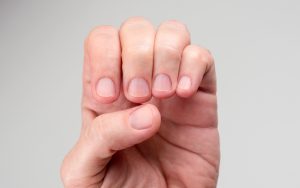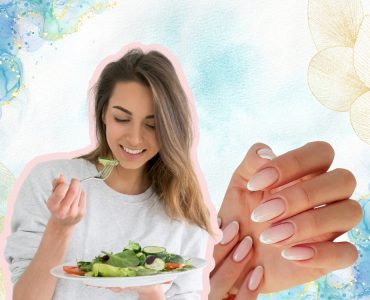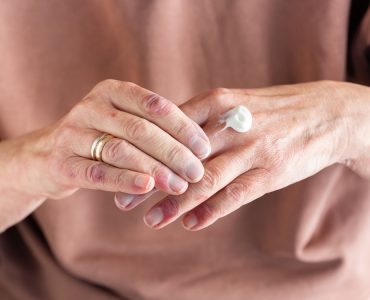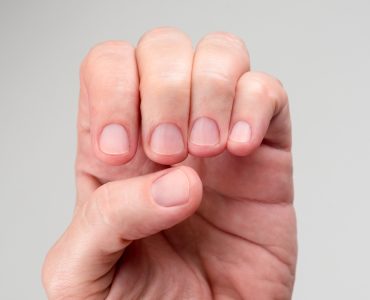Having healthy and strong nails not only adds beauty to our hands but also reflects our overall well-being. Just like our skin and hair, nails require proper care and nutrition to stay in their best shape. While there are several factors that contribute to the health of our nails, our diet plays a crucial role.
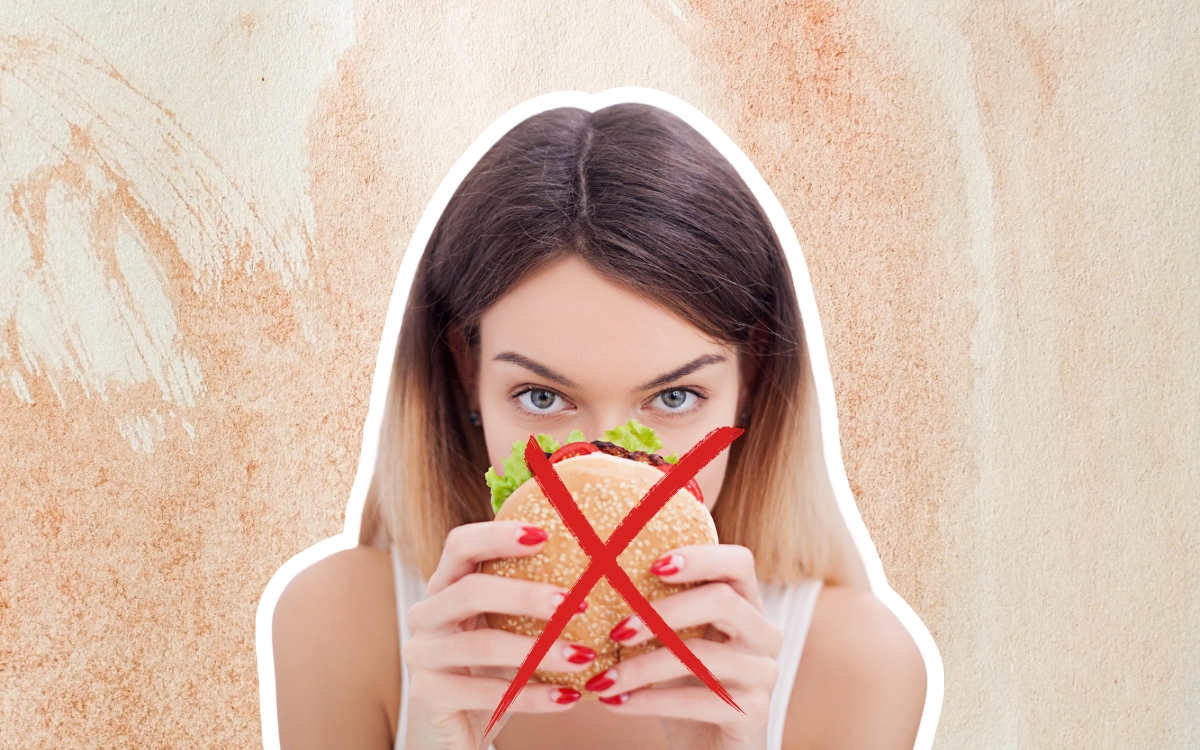
What we eat directly affects the strength, appearance, and growth of our nails. Unfortunately, certain foods can have a negative impact on our nail health. In this blog post, we will discuss some foods that you should avoid if you want to maintain healthy and beautiful nails.
Sugar: The Sweet Saboteur
Sugar has become a staple ingredient in many of our favorite treats, but its impact on our overall health goes beyond just our waistlines. When it comes to nail health, excessive sugar consumption can be a major culprit behind weak and brittle nails. Let’s delve into the effects of sugar on our nails and explore ways to reduce its detrimental impact.
The Harmful Effects of Excessive Sugar Consumption
Consuming high amounts of sugar can wreak havoc on our nails. One of the primary reasons is that sugar contributes to inflammation in the body. Inflammation can disrupt the production of keratin, the protein responsible for healthy nail growth and strength. As a result, nails may become more susceptible to breakage, splitting, and slow growth.
Hidden Sources of Sugar in Processed Foods and Drinks
Sugar can be found in various forms, often lurking in unsuspecting foods and beverages. Processed snacks, sodas, energy drinks, and even seemingly healthy options like flavored yogurt or granola bars can contain high amounts of added sugars. It’s essential to carefully read food labels and be mindful of the ingredients to identify hidden sources of sugar.
Tips for Reducing Sugar Intake and Alternatives to Satisfy Sweet Cravings
Reducing sugar intake doesn’t mean eliminating all sweetness from your life. Here are some strategies to cut down on sugar consumption while still satisfying your sweet tooth:
- Choose whole fruits: Opt for whole fruits, which contain natural sugars along with fiber and essential nutrients. They provide a healthier alternative to processed sweets.
- Sweeten with natural alternatives: Experiment with natural sweeteners like honey, maple syrup, or stevia, which have a lower glycemic index and offer a more balanced sweetness.
- Read labels and make informed choices: Check food labels for hidden sugars and opt for products with lower sugar content or no added sugars.
- Gradually reduce added sugars: Gradually reduce the amount of sugar you add to beverages, baked goods, and other homemade recipes. Over time, your taste buds will adapt to less sweetness.
- Focus on whole, unprocessed foods: Emphasize a diet rich in whole grains, lean proteins, and vegetables, as they are generally lower in added sugars.
Processed Foods: Nailing the Culprits
Processed foods have become a prevalent part of our modern diet, offering convenience and accessibility. However, these convenient choices often come at the expense of our nail health. Processed foods can contain a host of harmful additives, preservatives, and ingredients that can weaken and damage our nails. Let’s explore the impact of processed foods on nail health and discover ways to minimize their negative effects.
How Processed Foods Weaken and Damage Nails
Processed foods often lack essential nutrients that are vital for maintaining strong and healthy nails. They tend to be high in refined carbohydrates, unhealthy fats, and sodium, while being low in beneficial nutrients such as vitamins, minerals, and antioxidants. This nutritional imbalance can lead to weakened nails, increased brittleness, and slow nail growth.
Harmful Additives and Preservatives to Watch Out For
Processed foods are notorious for containing a range of additives and preservatives that can harm nail health. Some common culprits include artificial food colorings, trans fats, high fructose corn syrup, and chemical preservatives. These additives can contribute to inflammation, oxidative stress, and dehydration, which negatively impact the strength and appearance of our nails.
Opting for Whole, Unprocessed Foods for Optimal Nail Health
Making a conscious effort to include more whole, unprocessed foods in our diet can significantly benefit our nail health. Here are some recommendations:
- Choose whole grains: Opt for whole grains like brown rice, quinoa, and whole wheat bread instead of refined grains. Whole grains are rich in B vitamins, iron, and zinc, which promote nail strength and growth.
- Increase vegetable intake: Incorporate a variety of colorful vegetables into your meals. Vegetables provide essential vitamins, minerals, and antioxidants that support overall nail health.
- Include lean proteins: Opt for lean protein sources such as poultry, fish, tofu, and legumes. Protein is crucial for the production of keratin, the protein building block of nails.
- Embrace natural snacks: Swap processed snacks with healthier alternatives like fresh fruits, raw nuts, and seeds. These provide essential nutrients while avoiding the harmful additives found in processed snacks.
Mindful Meal Preparation and Planning
Taking control of your food choices through mindful meal preparation and planning can help minimize reliance on processed foods. By cooking meals at home using fresh, whole ingredients, you have more control over the nutritional content of your meals. This allows you to nourish your body and nails with nutrient-dense foods.
Alcohol: Cheers to Brittle Nails?
Alcohol is a popular indulgence for many, but its effects extend beyond just a hangover. When it comes to nail health, excessive alcohol consumption can be detrimental, leading to weakened and brittle nails. Let’s explore the impact of alcohol on nails and discuss ways to maintain nail health while enjoying a balanced lifestyle.
The Impact of Alcohol on Nail Strength and Moisture
Alcohol acts as a diuretic, causing increased urination and dehydration. This dehydration affects not only our overall body but also our nails. When nails lack proper hydration, they become more prone to dryness, brittleness, and breakage. Additionally, alcohol can hinder the absorption of essential nutrients needed for nail health, such as vitamins and minerals.
Dehydration Effects and the Importance of Hydration for Healthy Nails
Proper hydration is essential for maintaining healthy nails. When our bodies are adequately hydrated, it reflects in the moisture levels of our nails. On the other hand, excessive alcohol consumption can disrupt the natural moisture balance, leading to dry, weak nails. Staying hydrated by drinking plenty of water is crucial for nail health.
Strategies for Moderation and Healthier Alternatives to Alcoholic Beverages
Enjoying alcohol in moderation is key to maintaining nail health. Here are some strategies to consider:
Moderation Is Key
Limit alcohol consumption to moderate levels. The Centers for Disease Control and Prevention (CDC) defines moderate drinking as up to one drink per day for women and up to two drinks per day for men.
Hydration Alongside Alcohol
If you do choose to consume alcohol, make sure to alternate alcoholic beverages with water. This helps to counteract the dehydrating effects of alcohol and keeps your body and nails adequately hydrated.
Opt for Healthier Alternatives
Consider exploring non-alcoholic options or mocktails that provide the enjoyment of a drink without the alcohol content. This way, you can still partake in social gatherings or celebrations while reducing the potential negative impact on your nails.
Nail-Friendly Drink Choices
If you prefer to enjoy alcoholic beverages, opt for drinks that are lower in alcohol content and have fewer added sugars. Choosing lighter options like wine or clear spirits mixed with soda water and fresh fruit can be more nail-friendly compared to sugary cocktails or heavy beers.
Unhealthy Fats: The Greasy Foe
When it comes to nail health, not all fats are created equal. Unhealthy fats, such as trans fats and saturated fats, can be a greasy foe that poses a risk to the strength and vitality of your nails. Let’s delve into the impact of unhealthy fats on nail health and explore healthier alternatives to maintain strong and resilient nails.
The Relationship between Unhealthy Fats and Nail Health
Unhealthy fats, such as trans fats and saturated fats, can contribute to inflammation and oxidative stress in the body. These processes can hinder the production of keratin, the protein responsible for the structure and strength of our nails. When our bodies lack sufficient keratin, nails can become weak, brittle, and more prone to breakage.
Identifying High-Fat Foods That Can Negatively Affect Nails
To protect your nail health, it’s crucial to be mindful of the types of fats you consume. Foods high in unhealthy fats include fried foods, processed snacks, fatty meats, full-fat dairy products, and baked goods made with hydrogenated oils. These fats not only impact nail health but can also contribute to other health issues.
Incorporating Healthier Fats for Stronger, More Resilient Nails
Instead of avoiding fats altogether, focus on incorporating healthier fats into your diet. Here are some options to consider:
- Omega-3 fatty acids: These healthy fats can be found in fatty fish like salmon, mackerel, and sardines, as well as in walnuts, flaxseeds, and chia seeds. Omega-3 fatty acids have anti-inflammatory properties that can promote nail health.
- Monounsaturated fats: Foods like avocados, olive oil, and nuts (e.g., almonds, cashews) are rich in monounsaturated fats. These fats support nail strength and can contribute to overall heart health.
- Nutrient-dense sources: Include foods rich in vitamins and minerals essential for nail health, such as vitamin E (found in almonds, spinach, and sunflower seeds) and zinc (found in lean meats, legumes, and pumpkin seeds).
- Cooking oils: Opt for healthier cooking oils like olive oil, coconut oil, or avocado oil when preparing meals. These oils contain a better balance of healthy fats compared to oils high in saturated or trans fats.
Conclusion
In conclusion, our nails deserve as much attention and care as any other part of our body. By being mindful of the foods we consume, we can significantly improve the health and appearance of our nails. Remember to avoid foods high in sugar, processed foods, alcohol, and unhealthy fats.
Instead, focus on incorporating nutrient-rich foods into your diet, such as leafy greens, lean proteins, whole grains, and foods rich in biotin, vitamin E, and omega-3 fatty acids. By making these dietary changes and following proper nail care practices, you can ensure that your nails remain strong, resilient, and beautiful.



